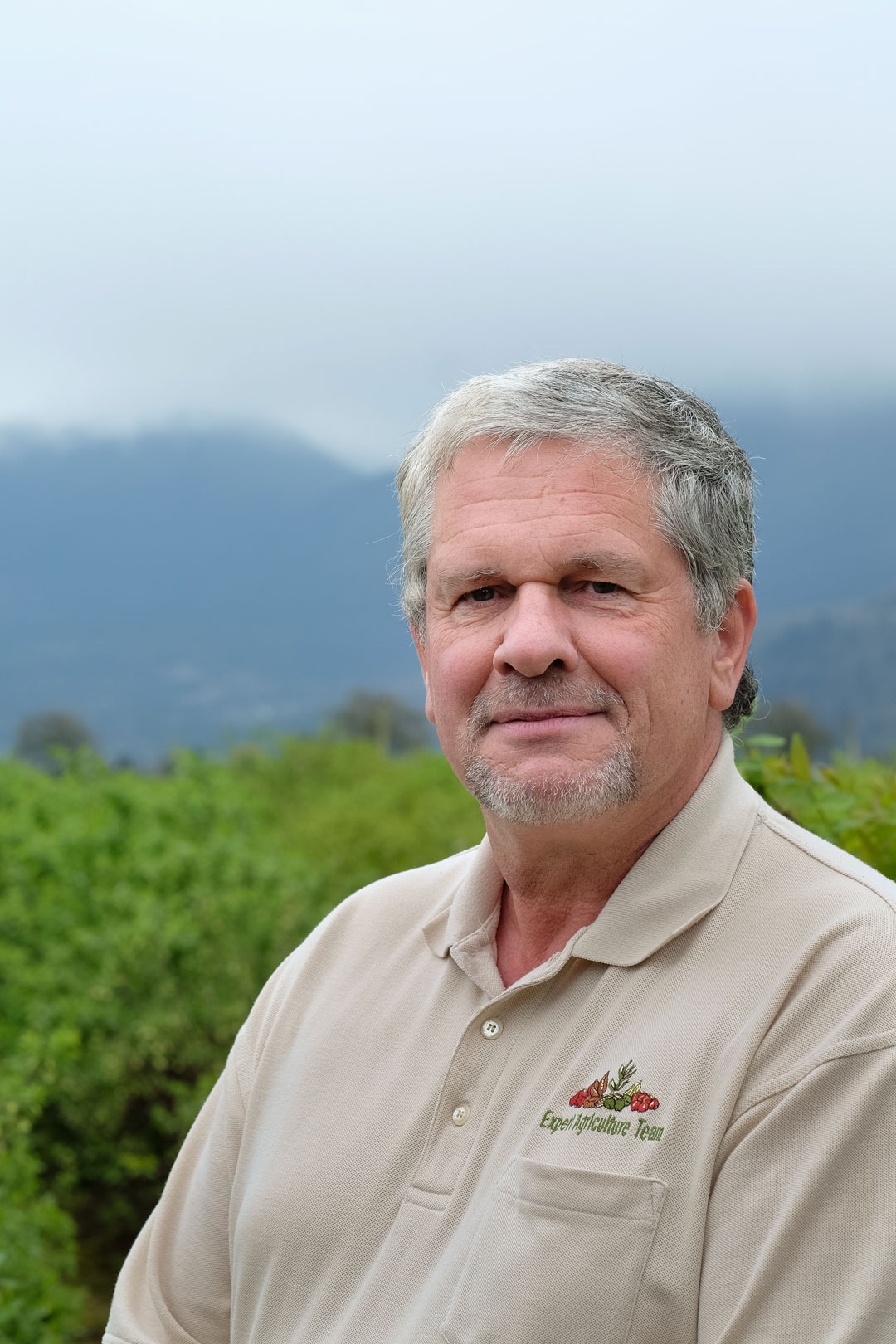Tom Baumann, Associate Professor at the University of the Fraser Valley (UFV), would rather speak about the students he has mentored and their contributions to agriculture than reveal anything about his own accomplishments, but that is a common trait in many effective teachers. Baumann received a bachelor of science and first master’s degree from a German university, and then completed a second master of science at the University of BC. Baumann has worked with UFV since 1990, and his focus has always been on inspiring the next generation.
“It’s not just important to encourage young people to pursue a career in agriculture, it’s crucial. Right now we’ve got a grey-hair generation of farmers over the age of sixty who are all going to hand over the farm, and quite frequently it is not to their children or a relative but another party who purchases the farm. Therefore, I find it crucial that we educate and instill excitement so there is a longing for a better future for these up and coming young farmers. These will not be farmers who push a broom and wield a pitchfork; they will be farmers with GPS guided tractors, with modern liquid feed fertilizers and more sustainable farming.”
Baumann makes it a practice to hire from the pool of students he teaches at UFV for positions in his own company and doesn’t necessarily choose those with perfect grades. “I look for students I can work with and I know can excel. My students have succeeded despite my mentoring, I think,” Baumann joked. His company, Expert Agriculture Team Ltd. (EAT) was founded as a limited company in October of 2006. It is primarily a consulting business which works with fruit, vegetable, greenhouse and nursery growers in the Fraser Valley. “We do not provide day-to-day farm advice, only for special events such as when the Maan Farm retail store burned and they needed help getting business back up as soon as possible,” Baumann explained. A few of his lucky students help with the research and development at EAT.
The EAT team also includes many collaborators in industry (growers, field advisors, private companies such as BW Global), Science and Kinesiology professors at UFV, KPU, UBC, SFU, VIU, experts at BC Ministry of Agriculture, and researchers at Agriculture and Agri-Food Canada.
Wherever Baumann goes, he bumps into ex-students whom he is delighted to see again. “Some of them are chairs or presidents of grower organizations; some of them serve on BC and Canada wide committees; some of them are part of the Young Farmers Association, and when they shake my hand, it is better than any pay I’ve received from the university.”
When asked where he found his own passion for agriculture, Baumann shared how his great aunt Lisa would teach him about plants when he was a toddler. “Sometimes it was ornamentals, but mostly it had to do with food. I also had fantastic biology and geography teachers in high school who inspired me to put all I’d learned together, and then I went on to university into something called applied biology. This included geography, biology and other sciences and of course we learned about food and agriculture.”
“When I did my advanced degree at UBC, I was taught by Dr. Eaton who inspired in me a love of agriculture and a love for food. Dr. Eaton shared; my great aunt shared; my teachers shared their knowledge and I am just following in their footsteps.”
Baumann specialized rather early in berries, and has been employed by Fraser Valley Strawberry Growers Association (now called BC Strawberry Growers Association) and later by BC Raspberry Growers Association, now called Raspberry Industry Development Council. Baumann has felt incredibly lucky in his career. “I fell into a job that I like—many jobs in fact—and I go to work with a smile on my face, not dragging my feet. Sometimes I go home exhausted, but I know I’ve done a good job and I’ve passed on information to someone else who can turn that into a profit and feed the world.”
Baumann commented that there are many areas of interest in the agriculture sectors for new students. “Cannabis growing is a multi-billion dollar business and the problem is most of it is illegal, but changes have made it a legitimate horticulture business. Commercial growing is becoming popular and I get asked many questions, but it is difficult to do the research in a public institution,” he added with a laugh. “When we talk about regular food production, we have very high return crops, and low return crops, but there’s work to be found in both. I refer people to the greenhouse industry which has a good return and produces safe food.” Baumann also described how a variety of sectors require Integrated Pest Management (IPM) experts to create sustainable growing.
“I also hope that organic growers will come to the conclusion that they can grow commercially on a large scale and the two streams—conventional and organic—will come closer to work together for the betterment of Mother Nature.”
Baumann enjoys the animated discussions with his students about organic and sustainable farming, and GMOs. “In the end, they all learn different approaches, but will still have to make their own mind up [about those topics].” He spoke proudly about certain recent students: Alicia Vandenbrink, in her third year with the company, specializing in field inspections, pests and diseases, and a science student at UFV with a Diploma in Agriculture. Zach Fleming, who is just finishing his second year as a Diploma student at UFV; he graduates this year and is going on to an Agriculture Degree from UFV. He specializes in plant breeder’s rights, field inspections, and HR management at EAT. Joey Levitzky has been with the company six months, and works in IT, field research, equipment and nursery work as his specialties; he’s in his second year of the Diploma Program at UFV. Rylie Evjen, in his first year of the Diploma program at UFV, has been with the company for three months. He specializes in managing research fields, nursery and equipment.
Baumann’s past students have moved on to occupy prominent positions: Jason Klaasen is now with the Business Risk Management Branch at BC Agriculture; Camila Diaz is now at Farm Credit Canada in Kelowna; Neal VanderHelm, is a farm manager on tree fruit orchard in the Okanagan; and Garion Loehndorf is an agricultural supervisor at Lucerne Foods.
Many of Baumann’s students find careers in the Canada Food Inspection Agency. They often take summer jobs with the CFIA and continue on afterwards as the jobs are secure and have attractive benefits.
Baumann encourages his students to start from the bottom and work their way up. “They should learn integrated pest management, how to correctly apply fertilizer, do the heavy lifting and know how to do it all themselves so they have the experience to guide others. Sometimes the new generation thinks they can walk into a greenhouse in a white lab coat with their hands in their pockets, but my students are not that way. We believe in the hands-on, get your fingers dirty approach.”
“There is also a demand for people with specific skills. The nursery industry is always looking for people knowledgeable about grafting, budding, propagation and aquaponics. They need growers who can lead teams and grow specialty crops. We need out-of-season growers, so we rely less on imports.”
Baumann envisions a future where the youth take agriculture to the next level. “I am a dreamer and a collaborator. With a little technology and a lot of knowledge we can grow more successfully. We are running out of arable land, and I see a chance for these young farmers to grow upwards, using greenhouses and technology to grow on less land.”
The next step for Baumann is to travel with his Expert Agriculture Team coworkers to tropical climates to see how other cultures grow. “I travel to learn and that’s how my students will continue to learn. The Team is only a stepping stone for them. I want to encourage them to pursue their own dreams. I want them to excel and be outstanding in their field. In the end, it is about our agriculture industry being on the leading edge with high quality, safe food for the people of Canada and beyond.”












